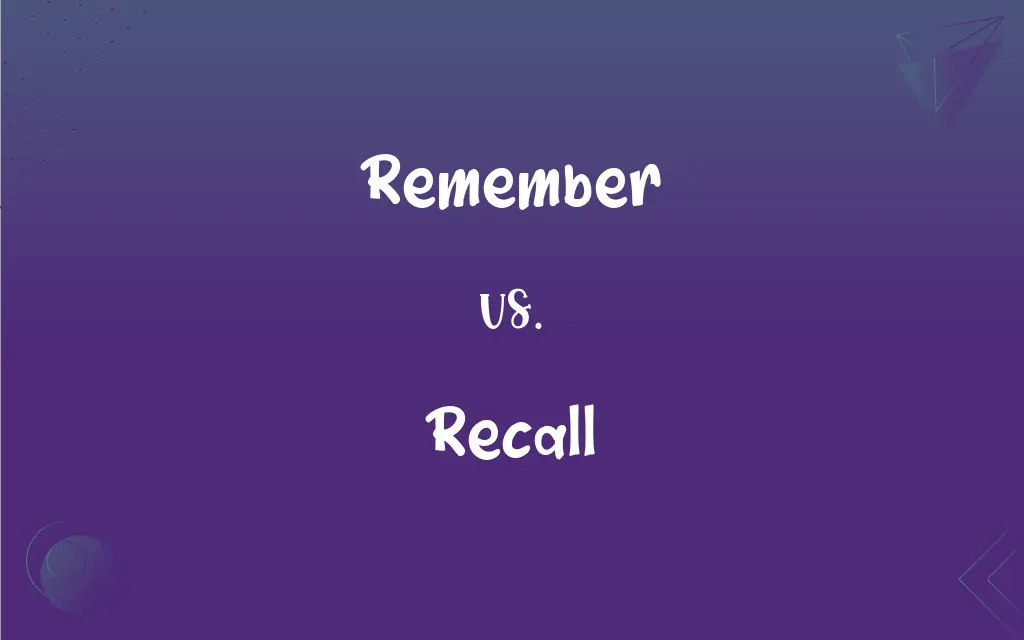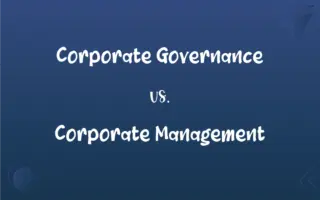Remember vs. Recall: What's the Difference?
Edited by Janet White || By Harlon Moss || Published on December 30, 2023
Remember involves bringing a past experience or fact into one's mind, while recall specifically refers to retrieving a specific piece of information from memory.

Key Differences
Remember refers to the ability to bring past experiences or information into one's mind without a specific prompt. It is often a spontaneous or voluntary act, where memories come to mind naturally. Recall, on the other hand, is the act of deliberately bringing a specific piece of information to mind, usually in response to a specific cue or question. It requires more conscious effort than remembering.
Remembering is generally more associated with a personal, emotional connection to the past. For instance, one might remember a childhood experience or a feeling associated with a past event. Recalling is more analytical and is often used in contexts where accuracy and specificity are important, such as recalling facts for a test or details in a meeting.
In terms of mental processes, remembering can be more passive and can involve a broad range of information, including sensory experiences and emotions. Recalling is more active, involving the retrieval of specific data or details from one's memory, often requiring concentration and focus.
Remember can also imply a continuous state of awareness or knowledge about something, not necessarily linked to a specific point in time. For example, one might always remember a friend’s birthday. Recall, in contrast, is typically momentary and specific, such as recalling the answer to a trivia question at a specific moment.
The usage of these terms also differs in language. Remember is more commonly used in everyday language and is less formal. Recall is often used in legal, academic, or professional contexts, where precision and specificity of memory are paramount.
ADVERTISEMENT
Comparison Chart
Prompt Requirement
Often spontaneous, without needing a prompt.
Usually requires a specific prompt or cue.
Emotional Connection
Often associated with personal, emotional memories.
More analytical, less about personal emotions.
Usage Context
Common in everyday language, less formal.
Used in formal contexts like legal or academic settings.
Scope of Memory
Can be broader, including general knowledge or feelings.
Specific, focused on retrieving particular details.
Mental Effort
Can be more passive or natural.
Requires more conscious effort and focus.
ADVERTISEMENT
Remember and Recall Definitions
Remember
To have in one's mind an awareness of something experienced in the past.
I remember the first time I rode a bike.
Recall
To retrieve from memory.
I can't recall the title of that book right now.
Remember
To keep someone or something in mind for attention or consideration.
Remember to buy milk on your way home.
Recall
To summon back to awareness of facts or memories.
The photo recalled memories of her childhood.
Remember
To retain information or details about something.
I always remember the passwords to my accounts.
Recall
To bring back a fact or information into one's mind.
He could recall every detail of the event.
Remember
To reminisce or recall a memory.
She remembers her grandmother's stories vividly.
Recall
To remember something learned or experienced.
She quickly recalled the answers during the quiz.
Remember
To bear in mind for future reference.
Remember this advice when you start your new job.
Recall
To call to mind by an act of memory.
He struggled to recall the password.
Remember
To recall to the mind with effort; think of again
I finally remembered the address.
Recall
To ask or order to return
Recalled all workers who had been laid off.
Remember
To have (something) arise in one's memory; become aware of (something) suddenly or spontaneously
Then I remembered that today is your birthday.
Recall
To remember; recollect
I don't recall her name.
FAQs
Can recall be used interchangeably with remember?
While they are similar, recall is more specific and deliberate.
Can you recall something you don’t remember?
Yes, sometimes specific cues can trigger a recall of forgotten information.
Is remembering always accurate?
No, sometimes our memories can be influenced by emotions or biases.
Do we use recall in everyday conversation?
It's less common and more formal than remember.
Can we improve our ability to remember and recall?
Yes, through practices like association and repetition.
Does age affect remember and recall?
Yes, both can be affected by aging.
Can stress impact our ability to remember and recall?
Yes, high stress levels can negatively affect both.
Do remember and recall use different parts of the brain?
They involve overlapping but distinct neural processes.
Is remember always voluntary?
Not always; sometimes memories can come to mind spontaneously.
Is recall important for learning?
Yes, it's crucial for retrieving learned information.
Can emotional events affect how we remember or recall?
Yes, emotions can strongly influence both processes.
Are there diseases that specifically affect recall?
Yes, conditions like Alzheimer's can severely impact recall abilities.
Does recall require more mental effort?
Generally, yes, since it's about retrieving specific information.
Is it easier to remember or recall information?
It depends on the context and the individual's memory.
Is remember more linked to recognition?
Yes, remembering often involves recognizing past experiences.
Is it normal to have trouble recalling but easy to remember?
Yes, it's common to easily remember experiences but struggle to recall specifics.
Can sleep affect how we remember or recall?
Yes, good sleep is important for memory consolidation.
Can we train our brains to better remember and recall?
Yes, through memory exercises and mindful practices.
Does the way we encode information affect recall?
Absolutely, the encoding process is crucial for later recall.
Is it possible to recall something never actually experienced?
Yes, false memories can occur, where we recall events that didn’t happen.
About Author
Written by
Harlon MossHarlon is a seasoned quality moderator and accomplished content writer for Difference Wiki. An alumnus of the prestigious University of California, he earned his degree in Computer Science. Leveraging his academic background, Harlon brings a meticulous and informed perspective to his work, ensuring content accuracy and excellence.
Edited by
Janet WhiteJanet White has been an esteemed writer and blogger for Difference Wiki. Holding a Master's degree in Science and Medical Journalism from the prestigious Boston University, she has consistently demonstrated her expertise and passion for her field. When she's not immersed in her work, Janet relishes her time exercising, delving into a good book, and cherishing moments with friends and family.






































































